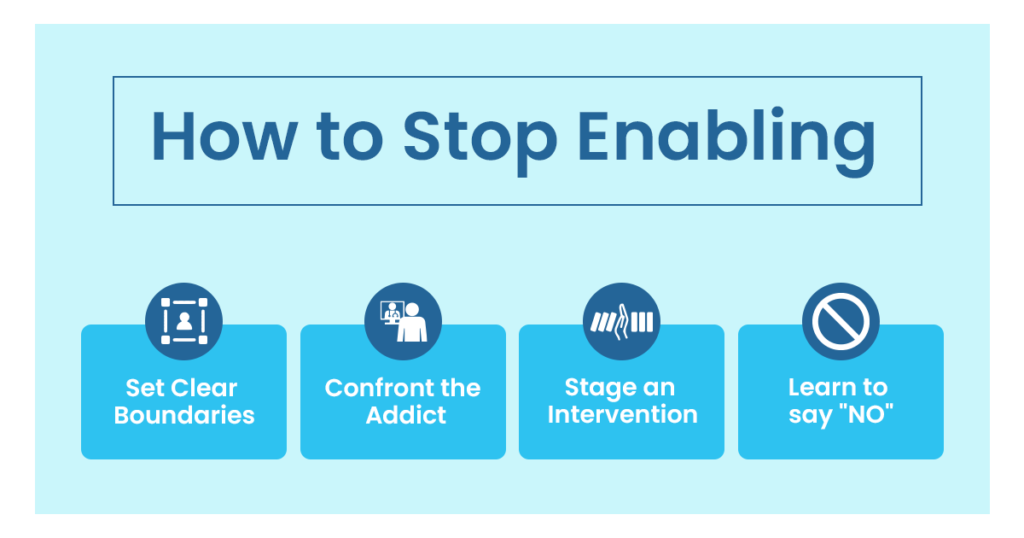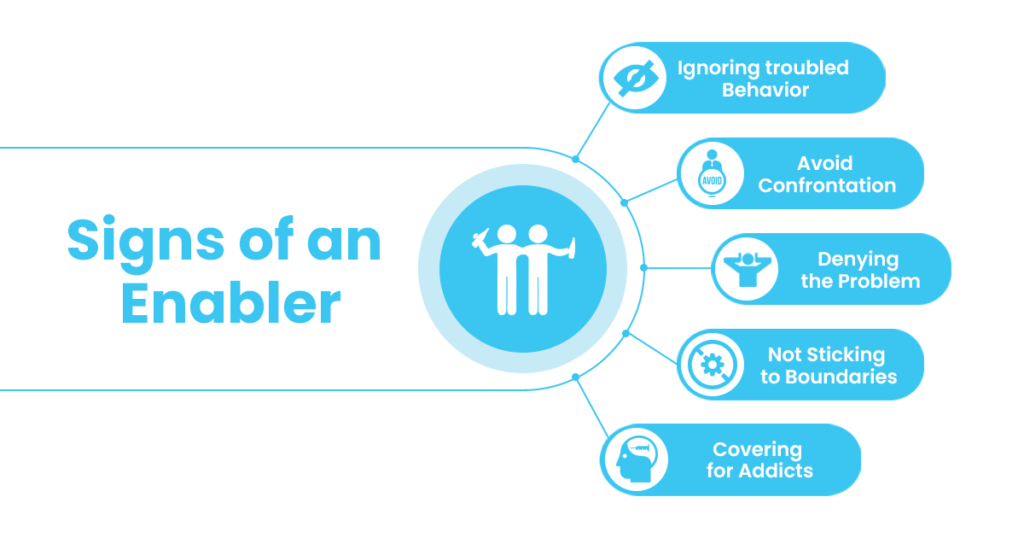
By the dictionary, the term enabling is defined as making something easy to do or establishing favorable conditions for its occurrence. This simple definition can be applied to various actions that somehow allow an addict to carry on with their harmful habits.
Addiction is a disease that can impact each family member differently. Once the addiction is known, family members often adopt new roles in their relationships with the individual. The enabler’s role is seen as an unhealthy and damaging role to the person’s recovery from substance use disorder. It is important to know bad habits of an enabler and ask yourself if you may exhibit some yourself. It is possible to prevent more damage to the family dynamic by adequately educating yourself about addiction and its harmful effects.
An enabler is a person close to an individual struggling with addiction whose actions prevent a successful recovery. This can be a family member, romantic partner, close friend, or another loved one.
While most enablers may have good intentions, they cause more damage than good. Unintentionally, enablers encourage or tempt individuals who need help regulating their unhealthy behavior. This is because enablers have difficulty determining the boundary between what is acceptable and unacceptable in their presence while the person is recovering from their addiction.
Signs or Characteristics of an Enabler
There are several common signs and characteristics of an enabler. While reading this, it is essential to pose challenging questions to yourself. Are you the enabler, or is it another member of your family? It is not helpful to a substance-addicted individual and the problematic behavior should be identified and confronted.
Ignoring the Problematic Behaviors
Enablers usually live in what is commonly referred to as a “dream world” in which their loved one’s drug or alcohol problem has no negative consequences. They often justify the actions of the addicted person by denying the seriousness of their condition and allowing bad behavior. The enabler ignores clear warning signs, such as the individual’s abandonment of responsibilities, missed social commitments, job loss, etc. Ignoring and making excuses for a loved one with an addiction is ineffective and only permits the problem to continue.
Avoiding Confrontation
Enablers commonly avoid confrontation to keep the peace. You may be an enabler if you avoid stepping on anyone’s toes and often find yourself beating around the bush.
When they ask for money, you give it to them without inquiring what you believe it will be used for. You allow this person to continue abusing substances because you recognize that an intervention may anger or perhaps drive them away.
Covering Up for Them All the Time
When concerned about the harmful effects of a loved one’s behavior, it is natural to want to assist the addicted person by shielding them from such discomfort.
When you fear that others may evaluate your loved one harshly or unfavorably, it’s easy to make excuses for them to other family members and friends. It is important to remember that this will not assist your loved one in changing their ways and will only enable them to continue their harmful habits.
Denying the Problem
Family members often struggle to accept that their loved one is struggling with addiction and need professional help. A person struggling with an addiction may claim to have only experimented with drugs once or twice to avoid scaring those they care about. They may even ask whether you believe they even have a problem. An enabler will often assure the individual they are not worried, that they do not consume that much alcohol, or otherwise deny the existence of a problem causing the person to neglect their issue.
Enablers may agree with their loved ones without genuinely believing them to keep them around. The addicted individual may even insist to other members of the family or circle of friends that everything is ok while the enabler has a hard time accepting this fabricated version of the truth.
However, ignoring the issue might encourage it to continue, even if you want it to end and for them to get better. You and your loved one may face difficulties if you deny the issue.
Feeling Resentment
When a pattern of enabling characterizes a relationship, it is typical for resentment or sentiments of wrath and disappointment to arise.
You may feel wounded and enraged after spending so much time attempting to assist someone who does not appear to appreciate your efforts. You may feel compelled to continue helping even though you know it is not good for them or your mental health.
Resentment can harm your emotional health, but it can also help you realize that the situation may not be beneficial and that you must set boundaries.
How to Stop Enabling Someone?
Do any of the signs mentioned above resemble patterns that have developed in your relationship with a loved one? These tips can assist you in learning how to truly help your loved one while maintaining your close relationship.
Set Clear Boundaries
The first step towards helping your loved one is letting them know that you want to continue assisting them, but not in a way that enables their unhealthy behavior. For instance, it may be a good idea to only drive them to appointments but refuse to pay for gas or anything else.
Confront Them
Instead of ignoring or dismissing substance abuse or other unhealthy activity, make it known that you are aware of it.
Confronting your loved ones for their addiction can help them understand that you disapprove of their actions while also letting them know your willingness to assist them in working toward change.
Stage an Intervention
Alcoholism and drug abuse are serious and affected individuals should be confronted about their actions before they experience the more severe consequences of their actions. You may also try speaking with your friends and family, so you don’t have to endure the burden alone.
Learn to Say “No”
This may initially be difficult, particularly if your loved one gets angry with you. However, saying no is often necessary for rehabilitation, and they will understand later. Remain composed yet firm. Remember to make consequences for any crossed boundaries clear.

Frequently Asked Questions (FAQs)
What does being an enabler mean?
An enabler is a person who enables someone to continue engaging in self-destructive behaviors (such as substance misuse) by providing excuses or making it possible to escape the consequences of such behavior.
What is an example of an enabler?
– Enablers will frequently pick up the addict’s slack. They take on more than their share of obligations: chores, errands, bills, and other essential things.
– Even after knowing that a loved one will use money irresponsibly, enable will provide them with continued financial support.
What causes a person to be an enabler?
Enablers have an intrinsic desire to be needed and believe the only way to earn people’s affection is to become indispensable. Many enablers derive self-worth and self-esteem from their generous deeds. They feel important and relevant. They get a sense of belonging and a sense of importance.
What type of person is an enabler?
Enablers are unwilling to do what is necessary for recovery for fear of upsetting their loved one but are willing to do what is convenient. They wish to be perceived as a nice person while placing the responsibility of discipline or correction on the shoulders of others.
The Haven Detox Can Help Your Loved One Recover
Addiction is a chronic disease often classified as a brain disorder because it disrupts brain circuits. It can alter the structure and function of the brain, specifically in the areas responsible for decision-making and impulse control.
Fortunately, addiction is a treatable condition through detox, therapies, and medication. The Haven Detox aims to provide effective treatment led by medical professionals for a safe, comfortable, and long-lasting recovery. We offer a thorough addiction treatment program and also treat common co-occurring disorders.
Contact us at (561) 328-8627 to learn more about getting help for your loved one struggling with a substance addiction.






